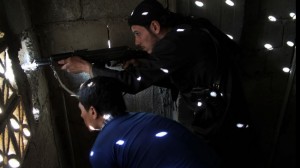 The United States and Iran, enemies in a proxy war in Syria, now appear likely to come together at an upcoming U.N.-sponsored meeting to try grapple with the worsening humanitarian crisis there. It's the most visible sign yet of the rival powers willingness to work together to resolve the crisis in Syria, according to several U.N.-based diplomats and officials. And it's another indication of the emerging thaw in relations between Washington and Tehran.
The United States and Iran, enemies in a proxy war in Syria, now appear likely to come together at an upcoming U.N.-sponsored meeting to try grapple with the worsening humanitarian crisis there. It's the most visible sign yet of the rival powers willingness to work together to resolve the crisis in Syria, according to several U.N.-based diplomats and officials. And it's another indication of the emerging thaw in relations between Washington and Tehran.
The U.N. chief relief coordinator, Valerie Amos, recently sent invitations to at least a dozen countries -- including the United States, Russia, Iran, and Saudi Arabia -- to participate in a high level meeting in Geneva aimed at prodding Syria's warring parties to provide relief workers access to more than 2.5 million people who have been cut off from the U.N. aid pipeline. Invitations have also been sent to Australia, Britain, China, France, Luxembourg, Russia, Kuwait, Qatar, and a representative of the European Union.
"The humanitarian situation in Syria is deteriorating on a daily basis," according to a confidential U.N. paper describing the initiative. "The objective of the high level humanitarian group is to foster and maximize cooperation among those countries with influence over parties to the Syrian conflict to address humanitarian challenges."
It remains unclear precisely when the U.N. meeting, which was initially planned for the middle of November, will take place. But a diplomat from a country on the invitation list said it would likely be scheduled within about two weeks.
U.S. and Iranian diplomats responded favorably to the request, according to diplomats. But one official said it was unclear whether Saudi Arabia, which has clashed with the United States over its approach to Syria and Iran, would join the group.
"We've received an invitation and hope to be in a position to confirm attendance in the near future," said a U.S. official, speaking on condition of anonymity. Alireza Miryousefi, a spokesman for the Iranian mission to the United Nations, did not say explicitly that Tehran would attend. But he told the Cable: "We welcome any efforts to help [the] Syrian people" in "parallel to political steps."
"Ms. Amos had discussed some humanitarian ideas on Syria during her visit to Tehran with Iranian officials," Miryousefi added. "The Iranian authorities welcomed the United Nations initiatives in order to help those in need [of] help."
The United States had previously been unwilling to participate with Iran in U.N.-brokered political negotiations over Syria, arguing that Iran was a party to the conflict. Washington's position has softened following a series of high level contacts with top Iranian officials, including Iran's newly elected president, Hassan Rouhani, who spoke by telephone with President Obama in September, the first time leaders of the two countries had spoken in over thirty years. However, the United States will only allow Iran to participate in political negotiations over the future of Syria if it endorses a U.N.-backed communique, hammered out in Geneva last year by former U.N. Secretary General Kofi Annan, calling for a political transition in Syria. Iran has not endorsed the so-called Geneva Communique.
The latest U.N. initiative will explore ways to keep up pressure on the Bashar al-Assad regime and the armed opposition to meet their obligations to grant unfettered access to humanitarian aid workers throughout Syria. On Nov. 4, Amos presented the Security Council with a confidential paper detailing the U.N. humanitarian goals in Syria.
The United Nations is currently providing assistance to more than 9.5 million civilians, including hundreds of thousands trapped under siege, in most cases by government forces. More than 2.5 million civilians, mostly located in rebel controlled areas, have received little or no aid from the United Nations and other Syrian-authorized relief agencies.
"The situation on the ground is highly challenging, complex and dangerous for humanitarian workers. Key humanitarian access routes have been cut off by the fighting," according to the U.N. paper. "Kidnappings and abductions of humanitarian workers are growing, as is hijacking and seizure of aid trucks. The Syrian authorities have yet to lift bureaucratic impediments and other obstacles hindering humanitarian work."
By Foreign Policy
The Iran Project is not responsible for the content of quoted articles.

 QR code
QR code